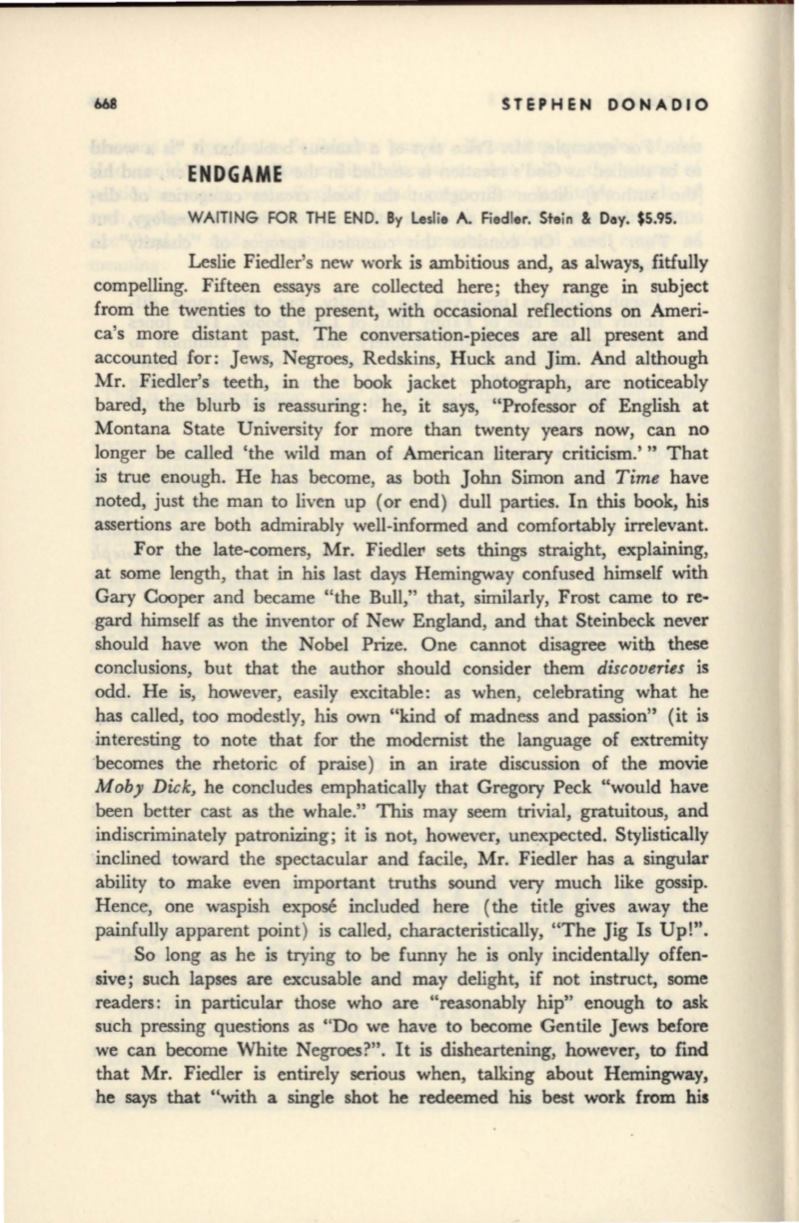

668
STEPHEN DONADIO
ENDGAME
WAITING FOR THE END. By
Leslie
A.
Fiedler. Stein
&
OilY. $5.95.
Leslie Fiedler's new work is ambitious and, as always, fitfully
compelling. Fifteen essays are collected here; they range in subject
from the twenties to the present, with occasional reflections on Ameri–
ca's more distant past. The conversation-pieces are all present and
accounted for: Jews, Negroes, Redskins, Huck and Jim. And although
Mr. Fiedler's teeth, in the book jacket photograph, are noticeably
bared, the blurb is reassuring: he, it says, "Professor of English at
Montana State University for more than twenty years now, can no
longer be called 'the wild man of American literary criticism.''' That
is true enough. He has become, as both John Simon and
Time
have
noted, just the man to liven up (or end) dull parties. In this book, his
assertions are both admirably well-informed and comfortably irrelevant.
For the late-comers, Mr. FiedleI' sets things straight, explaining,
at some length, that in his last days Hemingway confused himself with
Gary
Cooper and became "the Bull," that, similarly, Frost came to re–
gard himself as the inventor of New England, and that Steinbeck never
should have won the Nobel Prize. One cannot disagree with these
conclusions, but that the author should consider them
discoveries
is
odd. He is, however, easily excitable: as when, celebrating what he
has called, too modestly, his own "kind of madness and passion" (it is
interesting to note that for the modernist the language of extremity
becomes the rhetoric of praise) in an irate discussion of the movie
Moby Dick,
he concludes emphatically that Gregory Peck "would have
been better cast as the whale." This may seem trivial, gratuitous, and
indiscriminately patronizing; it is not, however, unexpected. Stylistically
inclined toward the spectacular and facile, Mr. Fiedler has a singular
ability to make even important truths; sound very much like gossip.
Hence, one waspish expose included here (the title gives away the
painfully apparent point) is called, characteristically, "The Jig Is Up!".
So long as he is trying to be funny he is only incidentally offen–
sive; such lapses are excusable and may delight, if not instruct, some
readers: in particular those who are "reasonably hip" enough to ask
such pressing questions as "Do we have to become Gentile Jews before
we can become White Negroes?". It is disheartening, however,
to
find
that Mr. Fiedler is entirely serious when, talking about Hemingway,
he says that "with a single shot he redeemed his best work from his









